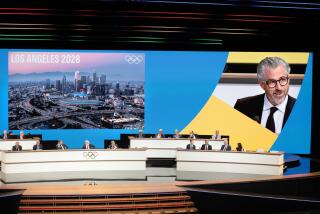Anti-doping agency facing some thorny issues
- Share via
The World Anti-Doping Agency convenes its annual meeting this week in Madrid fresh from a string of prominent enforcement triumphs.
American sprinter Marion Jones, long an agency target, publicly confessed to having taken steroids after having denied the accusation for years. Also, a split arbitration panel upheld the doping charge against 2006 Tour de France champion Floyd Landis, who was stripped of his cycling title. And scarcely a week passes in which some major athlete isn’t tied to doping.
Yet this year’s annual World Conference on Doping in Sport will open with the agency facing a number of challenges, including an ugly dispute over the succession to its departing president, Richard W. Pound of Canada, that has delegates of several European countries talking about splitting off from WADA. Questions also persist about WADA’s controversial procedures, especially its appeals process, as well as the technical capabilities of its 36 laboratories around the world.
The conference opens Wednesday with more than 1,500 attendees expected from sports organizations, the Olympic movement and government agencies. Leading its agenda is ratification of an update of WADA’s governing document, the World Anti-Doping Code, which was first implemented in 2004.
The new draft, which is to go into effect in 2009, is almost certain to be approved. It will stiffen the penalties for several categories of drug use and water down a key procedural protection for athletes -- the requirement that positive findings from an athlete’s primary, or A, sample be confirmed by tests on a backup, or B, sample taken at the same time. Several cases against prominent athletes, including Jones and Kenyan distance runner Bernard Lagat, had to be dropped after their B test results were negative or inconclusive. Under the new rules, a B test would not be needed to confirm a doping finding if the prosecuting agency “provides a satisfactory explanation” for the lack of confirmation. “That’s a huge change that the anti-doping agencies have always wanted,” said Howard Jacobs, a Los Angeles-based athletes’ lawyer. “The B test is one of the very few safeguards the athlete has, and now they want to do away with it.” Another proposed change would lengthen the possible suspensions imposed on athletes accused of doping. For a first offense, athletes found with even a trace of a banned substance in their sample are currently subject to a two-year ban from competition. (A subsequent violation carries a lifetime ban.)
The new code would lengthen the initial suspension to four years if any of a string of “aggravating circumstances” was present, including the use of drugs “as part of a doping plan or scheme.” Jacobs argues that such language could cover almost any accusation of doping, rather than exceptional cases.
The effort to make the anti-doping code tougher comes against the backdrop of heightened criticism of WADA. Landis, for instance, placed WADA’s Paris lab on trial as part of his public defense, and succeeded in exposing a raft of questionable actions and what even the arbitrators in his case acknowledged to be “sloppy practices.” The three-member arbitration panel ruled 2-1, however, that the lab’s flaws did not invalidate its findings that Landis had doped with testosterone during the 2006 Tour de France.
Late last year, however, another arbitration panel threw out a case against Spanish cyclist Inigo Landaluze because of procedural errors by the same lab. The insularity of this system is at issue in a case brought before a Belgian court by Kazakh cyclist Andrey Kasechkin, who maintains that WADA, as a nongovernmental organization, does not have the right to subject athletes to testing or to impose sanctions. The attorney for Kasechkin, who allegedly tested positive for homologous blood doping during a random blood screen in August, says he is prepared to carry his appeal to the European Court of Human Rights.
Still, the agency’s most immediate embarrassment is the unseemly brawl over its succession plan. Pound, 65, a former Olympic executive who was instrumental in founding WADA as a quasi-independent body in 2000, has served as its president ever since.
For months it had been assumed that Jean-Francois Lamour, a French government official and former Olympic medalist who is WADA’s vice president, would replace Pound. But last month Lamour abruptly resigned from the WADA board and withdrew his candidacy for the top job, saying the agency had become “discredited.”
Lamour’s complaint stemmed from the emergence of another candidate, Australian politician John Fahey, who he contends is backed by forces hoping to soften WADA’s stand against drugs in sport. Among other things, he has charged that Fahey is fronting for New Zealand officials who want to remove marijuana and other recreational drugs from the prohibited list. Fahey calls the charge “nonsensical.”
--
More to Read
Go beyond the scoreboard
Get the latest on L.A.'s teams in the daily Sports Report newsletter.
You may occasionally receive promotional content from the Los Angeles Times.






